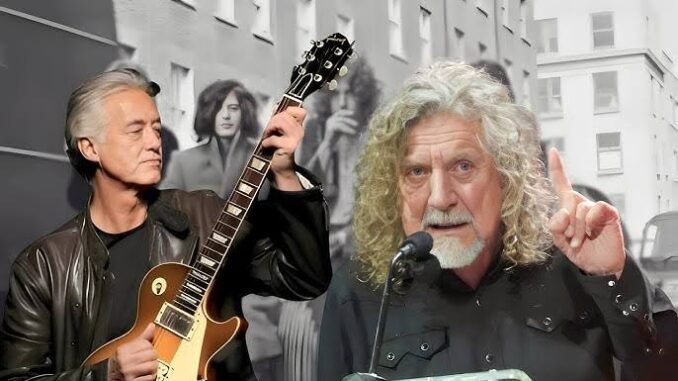
Jimmy Page’s Shocking Message to Robert Plant Ahead of Their 2000 Tour
In the late 1990s and early 2000s, the music world buzzed with anticipation as rumors swirled about a potential reunion of Led Zeppelin. The iconic band, known for their groundbreaking contributions to rock music, had not performed together since their 1980 breakup following drummer John Bonham’s tragic death. However, in 1998, guitarist Jimmy Page and lead vocalist Robert Plant reunited to release the album Walking into Clarksdale and embarked on a tour to promote it. This collaboration reignited hopes among fans for a full-fledged Led Zeppelin reunion.
The 1998 Reunion and Its Aftermath
The Walking into Clarksdale album marked a significant moment in rock history. Released in April 1998, it showcased the enduring chemistry between Page and Plant. The album received critical acclaim, with its lead single “Most High” becoming a hit on rock charts. The subsequent tour was a commercial success, further fueling speculation about a Led Zeppelin reunion.
However, despite the success of the album and tour, tensions between Page and Plant began to surface. In interviews, Plant expressed his reluctance to revisit the past, stating that he was not interested in reuniting Led Zeppelin for a full-scale tour. He emphasized his desire to explore new musical directions and avoid being confined to the band’s legacy. Statements
In contrast, Jimmy Page was vocal about his desire to reunite Led Zeppelin. He frequently hinted at the possibility of a full reunion tour, expressing his enthusiasm for performing with the band once again. Page’s public statements, however, were met with resistance from Plant, who felt that Page was disregarding his wishes and pushing for a reunion that he was not ready for.
In a 2007 interview, Page remarked, “You can’t really do it without Robert. So you can’t really do it… If he wanted to do it… then he could do it. But he doesn’t choose to, so I can’t speak for him.” This comment highlighted the growing divide between the two musicians regarding the future of Led Zeppelin.
Robert Plant’s Response and Desire for Independence
Robert Plant’s response to Page’s public statements was one of disappointment and confusion. In a 2014 interview, Plant expressed his feelings of being “disappointed and baffled” by Page’s actions. He revealed that he had offered to collaborate with Page on acoustic projects but was met with a lack of interest. Plant emphasized his desire to move forward musically and not be tethered to the past.
Plant’s reluctance to reunite Led Zeppelin was further underscored in a 2014 interview with Blabbermouth.net, where he stated, “We have a great history together, and, like all brothers, we have these moments where we don’t speak on the same page, but that’s life.” This comment reflected his view that the band’s legacy should remain intact and not be revisited for the sake of nostalgia.
The Ongoing Tensions and the Future of Led Zeppelin
The tensions between Page and Plant continued to affect their relationship and the prospects of a Led Zeppelin reunion. In 2008, Page expressed his frustration with Plant’s commitments to other projects, such as his collaboration with Alison Krauss. Page felt that Plant’s focus on these projects hindered the possibility of a Led Zeppelin reunion.
Despite these challenges, both musicians have occasionally hinted at the possibility of future collaborations. However, as of now, a full Led Zeppelin reunion remains unlikely, with both Page and Plant pursuing their individual musical endeavors.
Conclusion
The period following the 1998 reunion of Jimmy Page and Robert Plant was marked by a complex interplay of creative aspirations, personal dynamics, and differing visions for the future. While the 1998 collaboration reignited hopes for a Led Zeppelin reunion, the subsequent tensions between Page and Plant highlighted the challenges of revisiting past successes. Their story serves as a testament to the complexities of musical partnerships and the delicate balance between honoring a band’s legacy and pursuing individual artistic growth.
Leave a Reply